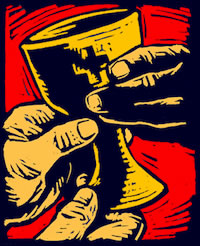
Body and Blood Sunday Year B (Corpus Christi)
We are in the afterglow of our Easter celebration. Last week we reflected upon the divine life of the Trinity, shared with us through the Saviour's Paschal Mystery. This year's Corpus Christi liturgy calls us to a deeper understanding of the Eucharist – the enduring presence in our midst of the Paschal Mystery in its entirety, the very ‘foundation and centre’ of the Church's life, as Vatican II reminds us. Today's readings take up the theme of Mark's gospel, ‘the blood of the covenant poured out’ for the whole human family.
To grasp what these readings have to say to us, we must take account of the profound symbolism blood had for old Israel – not a symbol of violence, but the sacred embodiment of life. As Moses ratified the old covenant with Yahweh, therefore, the blood – sprinkled on the altar (representing God) and on the people – expressed the life-giving union with God that was to become the very destiny of Israel. In his Eucharistic words, Jesus deliberately gives a new meaning to this old theme, repeating the words of Moses, ‘This is the blood of the covenant’, and adding a reference to the Servant Song of Is 53 – his blood will be a source of life for the whole world (‘for many’ is a Semitic expression used by the Isaian text, meaning ‘for all’).
For many people, the blood of Calvary has been associated almost exclusively with Christ's horrendous suffering. While not denying that awareness of the Saviour's passion is essential to Christian faith, the message of the Scriptures invites us to enlarge our perspective. St Paul's message to the first Christian generation was ‘whenever you eat this bread and drink this cup, you are proclaiming the Lord's death until he comes’ (1 Cor 11: 26). The Letter to the Hebrews spells out the magnificent implications of what Paul is saying. In the Saviour's death and resurrection he gives the world its one great act of true worship. He is the ‘priest’ who ‘offers himself as a perfect sacrifice’; his life-giving ‘blood’ enables us to ‘serve the living God’; as he enacts a final ‘covenant’, he takes us with him beyond the old Temple and its foreshadowing in the ritual of Mount Sinai, beyond ‘this created order’, into the very presence of God; in the Eucharistic sacrament , he fulfils ‘what was promised’ – in the Eucharist is fulfilled, the promise of ‘new wine’ in ‘the Kingdom of God’, with which Mark's reading ends. The Church has always seen the Eucharistic banquet as a foretaste of the joys of the Kingdom.
Today's liturgy, therefore invites us to reflect upon a theme of great importance for the renewal of the Church's liturgy. The Eucharist is far more than Christ's ‘real presence’ among us, as a kind of substitute for the fact that he is no longer among us as he was in his earthly life. In its fullness, the Eucharist is an action (‘Take and eat’, ‘Take and drink’; ‘Do this’). It is the central action of the Church's life because of the presence of the Lord himself, giving himself into the hands of his Father, as creation's perfect act of worship, and giving himself to us as food and drink, that we may make his Paschal Mystery our nourishment for eternal life.
John Thornhill sm

